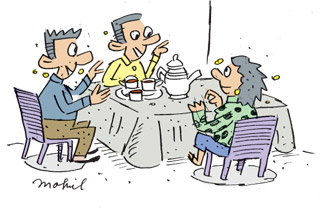|

by R. S. Karunaratne
Expression of
simultaneous events
We use 'as, when' and 'while' to talk about simultaneous events or
events that take place at the same time.
We can use these words to introduce a longer action or situation
which is going on when something else is happening.
|

While we’re debating the
issue, let’s have some tea. |
As she was watching television she saw her brother reading a novel.
The milkman always comes when I am having a shave.
While we were playing in the compound, a cobra came from the jungle.
'As' clauses usually introduces less important information and they
are used at the beginning of a sentence.
As it was getting late, we decided to stay in a hotel.
As I was just saying, I think the proposal needs further
consideration.
We usually leave out 'subject + be' after 'when' and 'white'.
I forgot to ask his name when leaving the cinema.
Don't forget to lock the front door when leaving home.
Give me a signal when ready.
While in India, I travelled to many interesting places.
While we're debating the issue, let's have some tea.
I wrote the essay while you were sleeping.
While we were in Malaysia, we stayed in three hotels.
I heard somebody coming while I was in the bathroom.
While you're in Colombo, brush up your English.
'While' can also mean 'although' in certain contexts.
While I agree that he is a rude person, the company needs his
services.
|

While we were playing in the
compound, a cobra came from the jungle. |
While I understand your situation, I am not in a position to help you
financially.
Sometimes, 'while' can mean 'but'.
My boss gets Rs. 100,000 a month while I get only Rs. 20,000!
Mary is a downright pessimist while I am an optimist.
I perform all the difficult tasks while he does nothing!
'A while' (written as two words) means 'a length of time'.
I went to Malaysia last year but stayed there for a short while
The tsunami came a while ago. (= a long time)
I haven't seen Ruby for a while (= for a long time ago)
Everything will be fine after a while (= soon.)
Fun with proverbs
According to the Oxford English Dictionary a proverb is a short pithy
saying in common and recognised use.
A proverb has three characteristics: few words, good sense, and a
fine image.
1. Live and let live
People are different by nature. They will not behave the way you
want. Therefore, you have to show some tolerance towards others. Then
you can expect the same tolerance from them.
2. The streets of London
are paved with gold.
London is the capital city of England. Being the capital city it has
all the facilities for business and higher education.
So, it is the best place to make your fortune. This applies not only
to London but also to other capital cities in the world.
3. Look before you leap
This is a very popular proverb which means that you should think
carefully before acting. In other words, beware of taking sudden and
rash decisions.
4. All is fair in love and war
There are no moderating rules governing the behaviour of people who
are in love or fighting a war.
5. The course of true
love never did run smooth.
Those who are in love have to face many obstacles.
6. Love is blind.
Those in love fail to see reality and their conduct may not be
approved by society.
They also fail to make rational judgements.
7. Manners maketh a man
A person's reputation and social standing depend on his behaviour.
8. One man's meat is
another man's poison.
People have different tastes. What one likes may be disliked by
another.
9. Marriages are made
in heaven.
According to Christianity, God provides you with the best partner. In
other words, marriage is a sacred union of a man and a woman.
10. Marry in haste, repent at
leisure.
Those who rush into marriage are likely to repent later.
11. No man can serve two masters.
Nobody can obey the directions of two masters or two conflicting
principles. For instance, no one can serve God and Satan.
12. Least said, soonest mended.
If you offend somebody by your conduct, do not try to offer
explanation. That will only make the situation worse.
13. A fool and his money
are soon parted.
A foolish person does not know the value of money. As a result, he
will waste the money he receives in no time.
14. Easier said than done.
It is easy to give advice. However, those who give advice do not know
the difficulty of doing something.
15. Money is honey.
Money is sweet and it attracts so many friends, relatives and even
strangers.
16. Good clothes open
all doors.
Everybody respects a well-dressed person. That is why we wear our
Sunday best when we attend an interview.
17. Boys will be boys.
Boys behave in a boisterous way. Sometimes they do not listen to
their parents and elders. This is quite natural. You cannot expect boys
to behave like elderly people.
Starters :
Know how to
use numbers
There are two types of numbers: Cardinal and ordinal.
Cardinal numbers represent amount. Examples: 1, 2, 3, 4, 5, 6, 7, 8,
9, 10, 15, 100
Ordinal numbers represent order.
Eg. First (1st), second (2nd), third (3rd), fourth (4th), fifth
(5th), sixth (6th), seventh (7th), eighth (8th), ninth (9th), tenth
(10th), eleventh (11th), twelfth (12th), thirteenth (13th), fourteenth
(14th), fifteenth (15th), sixteenth (16th) seventeenth (17th),
eighteenth (18th), nineteenth (19th), twentieth (20th), thirtieth
(30th), fortieth (40th), fiftieth (50th), sixtieth (60th), seventieth
(70th), eightieth (80th), ninetieth (90th).
We do not use the definite article when cardinal numbers occur after
the noun.
See figure 10 below.
Turn to page 150.
|

He gave me a cheque for rupees one million. |
We use ordinal numbers with the names of kings and queens.
Queen Elizabeth II (the second)
King Parakramabahu VI (the sixth)
King Henry III (the third)
We say the simple fractions in the following way.
1/2 (a half), 1/4 (a quarter), 1/5 (one fifth), 3/8 (three eighths),
2/3 (two thirds), 3/4 hour (three quarters of an hour)
Percentages
We write percentages with a special symbol % which is pronounced per
cent.
Telephone numbers
When giving telephone numbers we pause after three or four figures.
'O' is pronounced 'oh'.
2429 429 two four two nine, four two nine.
We use 'and' before the tens in a number.
We follow this rule when writing out a cheque.
Rs. five thousand four hundred and ten.
We use commas to divide large numbers into groups of three figures.
68,574; 98,876,494.
However, commas are not used in dates.
2011; 1964; 1941; 1885; 1815; 1915
We use 'a hundred' or 'one hundred' 'a thousand', or 'one thousand'
'a million' or 'one million'.
Who wants to live for a hundred years?
He gave me a cheque for rupees one million.
We use 'A' only at the beginning of a number.
I received hundred rupees.
One hundred rupees is not enough.
We usually do not use Roman numerals in modern English. However, they
are used in certain instances. Be familiar with the following Roman
numerals.
1: I, 2: II, 3: III, 4: IV, 5: V, 6: VI 7: VII, 8: VIII, 9: IX, 10:
X, 11: XI 12: XII, 13: XIII, 14: XIV, 15: XV, 16: XVI 17: XVII, 18:
XVIII, 19: XIX, 20:XX21: XXI,
30: XXX, 40:XL, 50: L
60: LX, 70: LXX, 80: LXXX, 90: XC100: C, 500: D, 1000: M, 1998:
MCMXCVIII
We use two ways of saying what the time is:
5.05: five past five or five five
5.10: ten past five or five ten
5.15: quarter past five or five fifteen
5.20: twenty past five or five twenty
5.25: twenty-five past five or five twenty-five
5.30: half past five or five thirty
5.35: twenty-five to six or five thirty-five
5.40: twenty to six or five forty
5.45: quarter to six or five forty-five
5.50: ten to six or five fifty
5.55: five to six or five fifty-five
6.00: six o'clock.
In informal English we drop 'o' clock.
The play starts at six thirty. |

